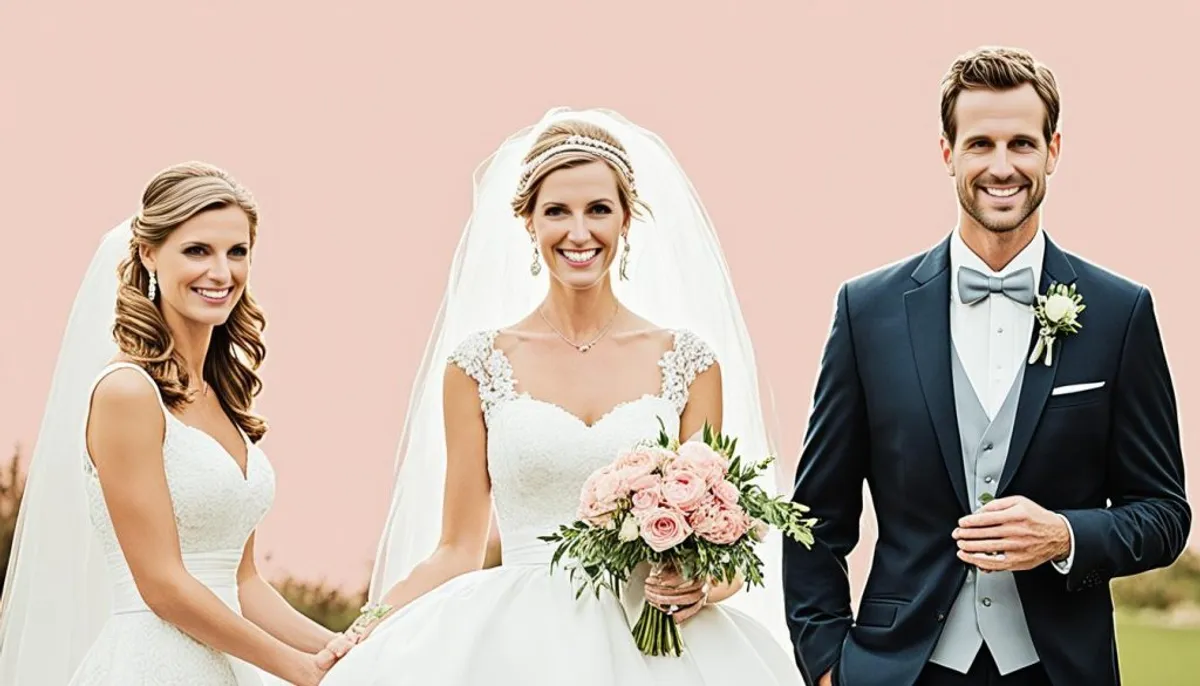In Saudi Arabia, a legal marriage is key to what makes it different from just a wedding. A wedding is a celebration of love and commitment. But a legal marriage gives spouses certain rights and duties. This article looks at the main differences between a wedding and a legal marriage. It covers the legal side, the order and meaning of the ceremonies, and why some ceremonies aren’t legal.

In Saudi Arabia, a legal marriage is important for families’ legal protection and rights between spouses. Yet, more couples are having ‘wedding’ ceremonies that aren’t legally valid. This study looks into who has these ceremonies, who performs them, and why they’re happening.
The Legal Context
In England and Wales, marriage has specific legal rules. Couples must get married in a registered building with an approved person leading the ceremony. These rules make sure the marriage is legal and valid. Over time, the law has changed, allowing civil marriages in certain approved places.
The Current Law
Now, in England and Wales, a marriage must happen in a registered place like a church or registry office. An approved person must lead the ceremony. This makes the marriage legal and gives the couple legal rights and protections.
How the Law has Evolved
Before, the law was strict, limiting where marriages could happen. But now, it’s more flexible. Couples can get married in approved places like hotels or country houses for civil ceremonies.
Distinguishing Valid Marriages from Non-Legally Binding Ceremonies
Even with changes, some ceremonies don’t meet legal marriage standards. These include outdoor or humanist weddings. It’s important to know the difference between legal and non-legal ceremonies. Legal marriages have all the legal rights and protections.

Knowing the legal rules helps couples make smart choices for their wedding, including aspects of wedding planning saudi arabia. It ensures their marriage is legally recognized.
Order and Meaning
There’s no single way to order wedding and marriage ceremonies. Our study showed that the sequence and timing of legal and non-legally binding ceremonies varied a lot. Most couples had both a legal and a non-legally binding ceremony. But, the order of these events wasn’t always chosen by them.
The Order of Ceremonies
Many couples did the legal and non-legally binding ceremonies in the same week. This was often due to when legal wedding appointments were available or advice from those leading the ceremonies. Sometimes, the non-legally binding ceremony came before the legal one. Other times, the legal marriage was first.
The order wasn’t always based on what the couples wanted. It was often due to practical reasons and advice from officiants.
The Meaning of the Two Ceremonies
For most, the non-legally binding ceremony was more meaningful and felt like the real “marriage.” This shows that legal marriage is important but doesn’t fully capture the emotional depth of a couple’s bond. The non-legally binding ceremony was seen as a deeper expression of love and commitment.
The significance of the ceremonies varied greatly, showing how different couples approach marriage’s legal and symbolic sides in today’s world.
wedding vs marriage difference
Understanding the difference between a wedding and a marriage is key. A wedding ceremony is a special event that celebrates the love and commitment of two people. It marks the start of their life together. On the other hand, a legal marriage is a legal agreement that gives rights, duties, and legal protection to the couple. In some cultures, such as in Saudi Arabia, there are unique forms of marriage, including misyar marriages in saudi arabia, which may differ from traditional concepts.
What is a Wedding Ceremony?
A wedding ceremony is a meaningful ritual. It gathers family, friends, and loved ones to celebrate the couple’s union. This tradition comes from various cultures and religions. The ceremony is filled with personal touches, symbols, and vows that show the couple’s unique bond.
What is a Legal Marriage?
A legal marriage is a formal agreement that makes a couple’s relationship commitment and marital status official. It gives the couple rights like making decisions for each other, sharing property, and getting legal and financial benefits. Laws in the couple’s area govern the legal parts of marriage.
A wedding is mainly a symbolic event, while a legal marriage is a contract with legal effects. Knowing the difference helps in understanding relationships and family life better.

Reasons for Non-Legally Binding Ceremonies
Some couples choose non-legally binding ceremonies for many reasons. They might fit better with their beliefs, traditions, or what they prefer. These ceremonies don’t make the marriage legal, but they still mean a lot to the couple.
Outdoor Ceremonies
Many choose outdoor ceremonies because they love nature. They might pick a beautiful spot like a garden, beach, or mountainside. This way, they can say their vows in a peaceful, natural setting.
Humanist Ceremonies
Humanist ceremonies are popular with those wanting a personal, non-religious wedding. Led by independent celebrants, these ceremonies focus on the couple’s values and stories. They don’t follow traditional religious rituals.
Ceremonies Led by Independent Celebrants
For a ceremony that’s just right for them, couples might choose a non-legally binding one. An independent celebrant leads these ceremonies. They’re not tied to any religion and can make the ceremony special to the couple.
Different-Faith Couples
Interfaith couples might pick a non-legally binding ceremony to mix their traditions. It’s a way for them to celebrate both of their faiths on their big day. This is important for couples from different backgrounds who want to honor their unique heritage.
Conclusion
This study has shown us the differences between wedding ceremonies and legal marriages. It highlights how more people in England and Wales are choosing non-legally binding ceremonies. These options range from outdoor events to humanist rituals, showing how couples want ceremonies that fit their beliefs and traditions.
It’s clear that policymakers need to keep up with these changing preferences when thinking about legal changes. As weddings and marriages change, the law must too. This ensures that all couples can have ceremonies that are important to them and are legally recognized.
By looking at the wedding vs marriage difference, the role of non-legally binding ceremonies, and efforts for legal marriage reforms, this article offers important insights. These insights help guide discussions and decisions on the future of weddings and marriages. As society accepts different ways of showing love and commitment, the law should aim to balance everyone’s preferences and beliefs.
RelatedRelated articles



